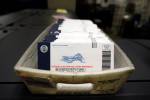Unwitting criminals
Given the explosion in the number of local, state and federal statutes over recent decades, it’s virtually impossible for anyone — even seasoned attorneys — to completely understand the extent or scope of many laws. And as author Nicholas von Hoffman once said, “Ignorance of the law is no defense, and since they’ll never tell you what the law is, you’re defenseless.”
In a story last week on the plight of marine biologist Nancy Black, The Wall Street Journal noted, “As the U.S. federal criminal code has grown increasingly large and complicated, critics from the left and right alike argue it is becoming too easy for Americans to unwittingly commit crimes.”
Ms. Black is caught up in a nightmare known in legal circles simply as “1001” — a reference to Title 18, section 1001 of the U.S. Code, which makes it a crime to knowingly make a material false statement in matters of federal jurisdiction.
Ms. Black has co-authored scientific papers and helped catalog the identities of hundreds of killer whales based on their skin markings. She also runs a whale-watching boat operation in Monterey, Calif. In 2005, when one of her boat captains whistled at a humpback whale that approached the boat, regulators investigated whether the incident constituted harassment of a whale, which is illegal under the Marine Mammal Protection Act of 1972.
Several days later, Ms. Black tells the Journal, an official from the National Oceanic and Atmospheric Administration asked her to provide video of the incident. She provided a video edited to show the captain’s whistling, she says, because that’s what she thought the investigator wanted.
About a year later, more than a dozen federal agents entered Ms. Black’s house with a search warrant and took away her files, photos and computers, the Journal reports. Over the five years since the raid on Ms. Black’s home, federal investigators have questioned friends and colleagues. Ms. Black has paid more than $100,000 in legal fees.
Finally, in January, Ms. Black was charged — not with whale harassment, but with lying. She also faces a charge of illegally altering the video. “I’m just a normal person, doing the thing I love,” she says. “How could this happen to me?”
What we have here is another federal agency with too much time and money on its hands, eager to play Maxwell Smart at the expense of everyday Americans who’ve done nothing in which a reasonable person would detect criminal intent. “There is no statute out there that’s more pernicious,” Stephen Saltzburg, a former Justice official and now a George Washington University law professor, told the Journal.
In 1998, over the objections of Justice Ruth Bader Ginsburg, who expressed concerns about “the extraordinary authority Congress, perhaps unwittingly, has conferred on prosecutors to manufacture crimes” out of false or even incomplete statements, the Supreme Court threw out the old exception for people denying to investigators they had committed wrongdoing, known as “the exculpatory no.”
And here we are.
Congress should revisit “1001” — quickly — and considerably narrow its scope and potential for abuse.


















